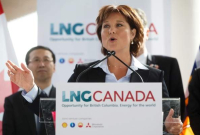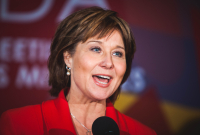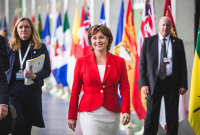Support strong Canadian climate journalism for 2025
The British Columbia government defended its lobbying registry Thursday as “one of the strongest regimes” in Canada, after a report revealed the province had been swamped in recent years by fossil fuel lobbying, and criticism mounts of the province as a "wild west" of political cash.
Meanwhile, one company named in the report, part of a coterie of seven entities that were both top political donors and the top lobbyists, says it would be a “mistake” to conclude it was only lobbying B.C. public office holders about fossil fuels, instead arguing it “primarily” discusses sustainable energy.
The BC Liberal Party has come under assault for operating a "pay-to-play" culture in the province. National Observer also revealed new analysis this week that paving and road maintenance companies donating to the party received nearly twice as many government contracts on average than companies that did not, according to research conducted by The Dogwood Initiative.
“We actually established the first-ever lobbyist registry in 2002 to establish transparency so British Columbians could see who is doing the lobbying,” said B.C. Justice Minister Suzanne Anton in the legislature during question period.
“There never was a registry before that. After some years of experience with that registry, we updated it in 2009, creating one of the strongest regimes for lobbyist registration in Canada.”
Anton was speaking in response to a question by Green Party leader Andrew Weaver, who asked about the report released Wednesday by the Canadian Centre for Policy Alternatives that 48 fossil fuel companies and industry groups donated over $5 million to the BC Liberals and the BC NDP between 2008 and 2015, with over 90 per cent headed to the ruling Liberals.
In a phone interview after question period, Weaver told National Observer that the minister’s response seemed phony.
“I don’t know where she’s making this up. She was reading from a script. Somebody obviously just gave her that script,” he said.
“It’s not one of the strongest in Canada. It’s a free-for-all, it’s a wild west.”
The BC Green Party pledged this week to bring in legislation if elected in the upcoming provincial election on May 9 that would ban former senior office holders and ministerial staff from lobbying for multiple years, government ministers from fundraising while in office, and foreign, corporate and union donations, among other measures.
FortisBC: We lobby on carbon-neutral energy too
The CCPA report stated that power and gas distribution firm FortisBC gave $210,073 to the BC Liberals over the 2008–15 timeframe it examined, and logged 2,377 actual or expected contacts with ministers, agencies, cabinet ministers and legislative assembly members in the 2010–16 period.
In an interview following publication of National Observer’s story on the report, spokesman Michael Allison said it would be “a mistake to take away from this report that FortisBC is talking to the government only about items relating to fossil fuels.”
“There’s more to FortisBC than a fossil fuel delivery company," said Allison. "We’re an energy solutions company and the report doesn’t capture that."
He noted the report’s outline of issues related to public concern over fossil fuels leading to increased greenhouse gas emissions, which are a major factor in the race against destructive and irreversible climate change. "Yes, we are a natural gas utility, but we primarily work with the government to talk about sustainable energy solutions," he said.
Allison said he didn't have the breakdown to show how precisely what proportion of the lobbying had to do with renewables compared to fossil fuels.
He said the company does talk "quite a bit" with the B.C. government about renewable natural gas (RNG) or biogas, which the company considers a carbon-neutral energy source. FortisBC lists several suppliers of RNG on its website.
Another aspect of the company, he said, is natural gas for transportation, which the firm argues can reduce greenhouse gas emissions "on a lifecycle basis by 15 to 25 per cent" compared to gasoline or diesel. One of the elements of B.C.'s 2016 climate plan is encouraging firms to convert their vehicles to RNG.
Both RNG and natural gas for transportation, said Allison, are "a relatively new area for the province of British Columbia" and as a regulated utility under the British Columbia Utilities Commission, the firm "works with the government to ensure that policies align with these innovations we want to provide to people."
"Partially because it’s an innovation and it’s new, it may not be fully captured through the regulatory process, there may need to be some discussions on policy," he said.






Comments